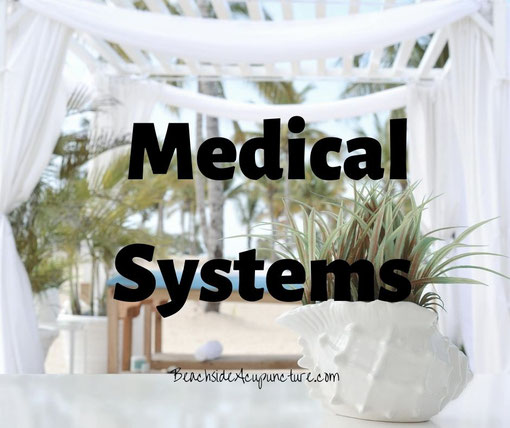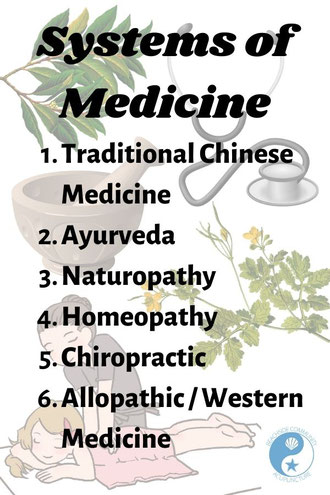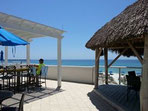
At our clinic we practice Traditional Chinese Medicine (TCM), a system of medicine that started centuries ago in China and includes therapies like Qigong, Tui Na (similar to chiropractic and massage in America), herbal formulas, and acupuncture. We call this a medical system because it has its own diagnoses - i.e. imbalances in yin and yang or the five elements based on evaluations that may include checking tongue and pulse - and own treatment plans that may include any of the above therapies as well as modifications to diet or lifestyle based on TCM principles. While we're obviously partial to TCM, we often recommend that our patients see practitioners who work within other medical systems to get a more complete health picture for themselves. While their are MANY out there, these are a few of the most popular...
Ayurveda
Often confused with TCM, Ayurveda is its own ancient medicine that originated in India. Diagnoses include imbalances in chakras and doshas - similar to five elements but definitely not the same - and therapies include diet modifications based on ayurvedic principles, yoga, herbal formulas, and treatments with body work and oil.
Homeopathy
A newer medical system than the previous two, homeopathy was started in Germany in the 1800s. A homeopath looks at everything in the body - asking even more questions than we do at the clinic, if you can imagine that! - and will prescribe homeopathic remedies and lifestyle adjustments to correct imbalances. Homeopaths operate on the principle of "like cures like" and by the time the remedies are diluted to their prescribed concentration, they no longer contain any physical traces of the original substance but rather just its energy within a sugar pill. While common remedies can be found at health food stores, we recommend always recommend seeing a professional who can determine precisely which remedies you need and in what strengths.
Naturopathy
Often used as a synonym for homeopathy, naturopathy is not related to the German medicine but relies on other holistic practices mostly outside of the previous four medical systems. Naturopaths may guide their patients through detoxification, recommend lifestyle adjustments, and educate them about diet adjustments. Western herbs like lavender and echinacea may be more likely to be used than the herbs used in TCM or Ayurveda, and they may also prescribe supplements or other therapies.
Chiropractic
Other ancient medicines had variations of this system, but chiropractic as we know it in America was started by D.D. Palmer in the late 1800s. Doctors of Chiropractic (DC) learn extensive anatomy from a Western medical perspective but their philosophy and focus is on the alignment of the spine and other joints and the impact of misalignment on the nervous system. There are many techniques within chiropractic, and chiropractors may choose to include adjustments, body work, diet modifications, supplements, medical technology, and more in their treatments depending on how they've set up their practice.
Allopathic (Western) Medicine
While the previous medical systems are considered holistic, alternative, or complementary in America, allopathic or Western medicine is the mainstream and dominant system. This medical system includes the testing and treatments that are probably the most familiar to you, such as blood work, magnetic resonance imaging (MRI), prescription and over-the-counter drugs, and surgery. However, there are variations within it that you may not recognize, for instance that a Western doctor may be a traditional medical doctor (MD) or a doctor of osteopathy (DO). Also, there are medical practitioners who have the traditional medical training but choose to look at their patients holistically, establishing a practice based on integrative medicine or functional medicine.
Even though we prefer a holistic approach to health and healing, we always encourage our patients to have a traditional Western doctor oversee their health as well. This medical system is wonderful for the amount of testing it has and absolutely critical in emergency medicine. Having an MD or DO that knows your health history is invaluable in monitoring changes in your body over time, and if you're the type of person who doesn't trust this system's therapies, it's still worth listening to your doctor's suggestions, researching the benefits and risks of them, and discussing alternative options with him or her if needed.

Is there more to each system that we discussed? YES. Our goal was to give a simple explanation of each of them and include therapies that you may hear on a regular basis, i.e. almost everyone knows what yoga is at this point but may not know that it's part of Ayurveda. There are specialties within each - for instance, some chiropractors only adjust the first cervical vertebra - and other therapies that have branched from each. (In acupuncture alone, there is Japanese acupuncture, Korean acupuncture, and Five Element acupuncture that share similarities with TCM but are very different otherwise.) We often refer our patients for physical therapy, massage, Reiki, and much more than what we included here.
Are there other medical systems besides these six? YES. Almost any given part of the world will have its own traditions, ways of treating ailments, etc.
Should you do more research into each system to see which may be of use to you in overcoming your health obstacles? YES. We believe that the different forms of medicine can complement each other well, despite their very different way of looking the body. You may resonate with one over another, or you may choose to follow a combination of them. It's our opinion that more health perspectives will just give you more information about what's going on with your body and more treatment options to get yourself back into balance and feeling great.

Kathleen Ketola is a Licensed Acupuncturist and the owner of Beachside Community Acupuncture. She loves providing affordable acupuncture to the residents of McKinney, Texas, and surrounding cities like Prosper, Frisco, and Plano, but she also enjoys educating the general public on how acupuncture and Traditional Chinese Medicine (TCM) can treat everything from pain to infertility to stress and beyond. Click "Book Now" at the top of this page to book an appointment or feel free to contact her at (214) 417-2260.








